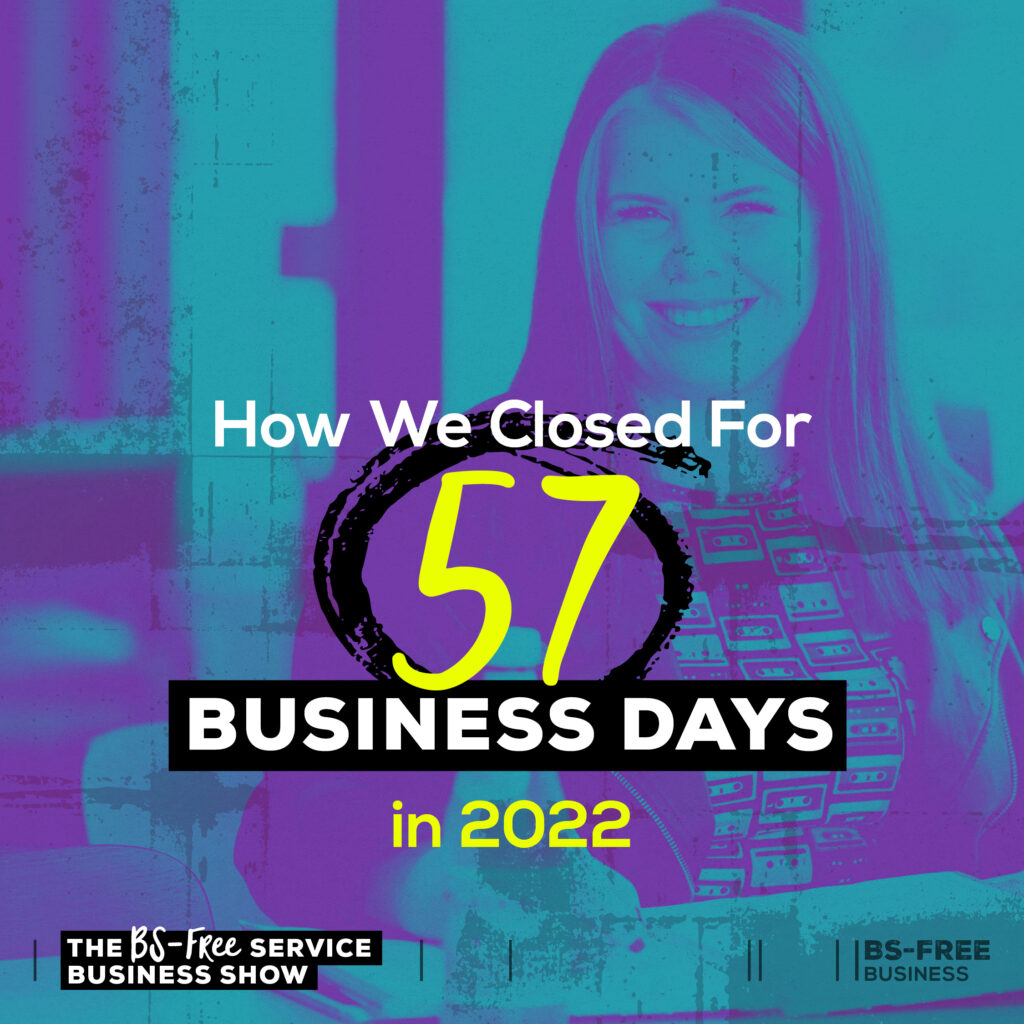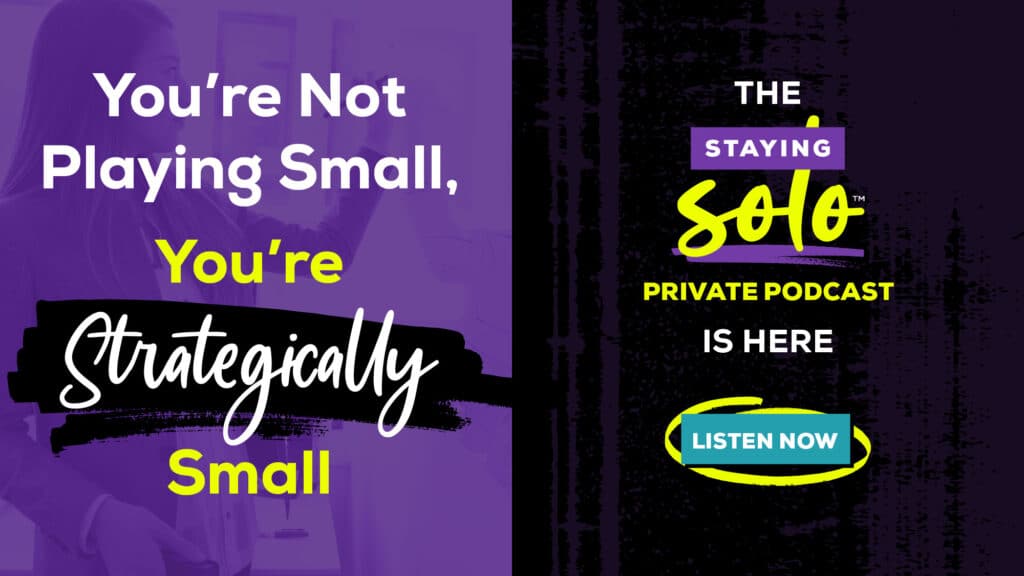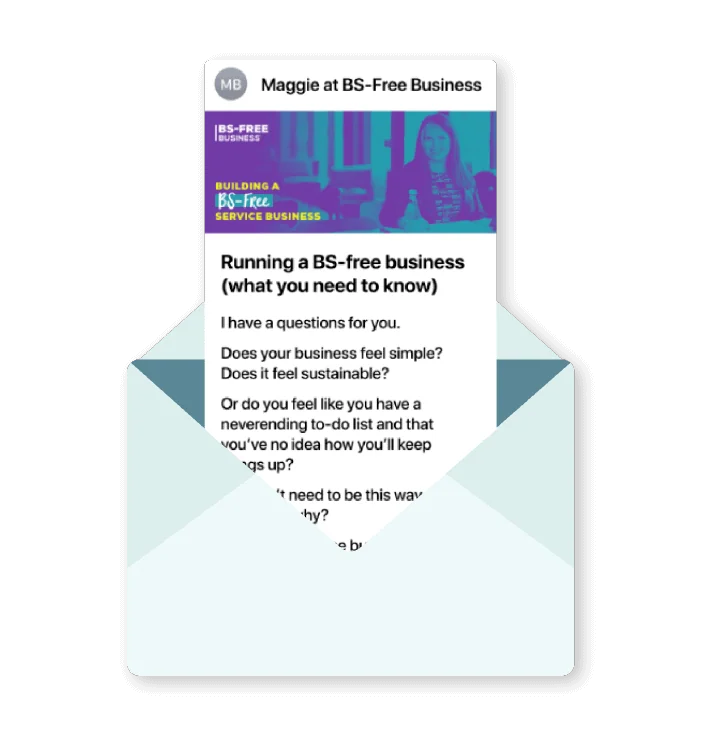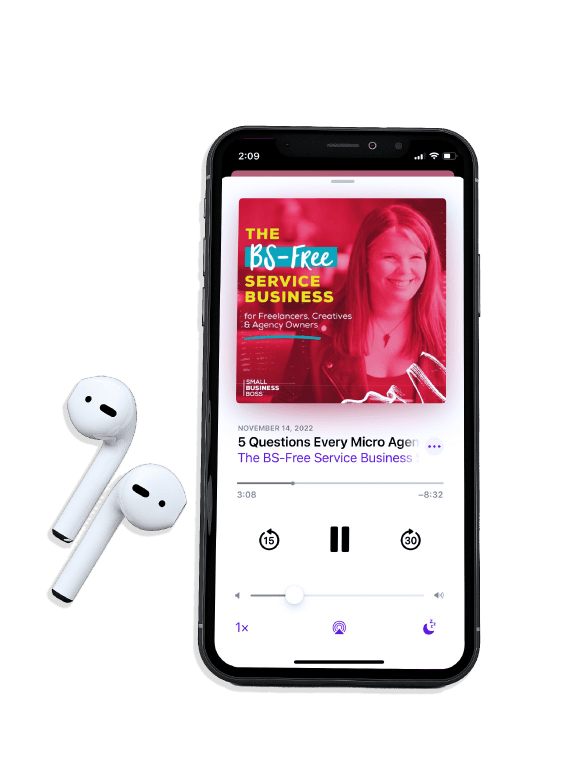
Search the site:
How We Closed for 57 Days in 2022
Back in late 2021, I made a decision that changed my business. I decided that starting in January 2022, our office would be closed on Fridays. This decision was made in addition to our two annual office closures in July and September, closing our office for 57 work days. In this episode, I’m sharing how exactly I did it and what you need to consider before you take the plunge.
A note on the 57 days: we arrived at that number as we were closed for four work days in July, six in December (as we have a lot of stat holidays), and most Fridays. We did work a few due to virtual retreats with our masterminds or prior work commitments.
While that may seem like it’s not a big deal, as so many of us are self-employed because we can be flexible, I can tell you that 15 months later, it’s been a game changer.
Since I started my business nearly 18 years ago, I’ve worked flex hours. I started my business when I had a one-year-old with limited childcare, so I had to be creative. Over the years, I’ve worked different schedules, and for probably ten years, I’ve not taken any meetings or calls on Fridays.
But I’d reached a point where I was having a challenging time holding to my Friday schedule with clients and with things always bleeding over into a day that was supposed to be a day off.
How We Rolled It Out
I wish I could say this was a strategic choice, but after I got a meeting request from a client who was being pushy, I snapped. Within 48 hours, all of our clients had been informed. And what’s funny is it was a non-issue, and clients have all been incredibly respectful and supportive.
Honestly, I wish I’d only done this sooner!
Over the past year, I’ve worked with multiple clients on rolling this out, and I’ve since realized how ridiculous it was for me to make this decision so quickly. This was a situation where I should have done more prep work regarding capacity and schedules in advance.
Luckily, it worked out, and every client who’s done this so far has been thrilled with the result. There’s been no better time to make this shift in your business because there’s a cultural moment where four days a week are picking up steam and, ultimately, acceptance even in big organizations.
In February 2023, the University of Cambridge shared the results of the world’s largest trial of the four-day working week. The findings suggest that a “four-day week significantly reduces stress and illness”. 71% of employees self-reported lower levels of “burnout,” and 39% were less stressed than at the trial’s start. The same pilot was done in the US and Ireland, with similar results, and the majority of companies intend to continue.
If big companies are willing to consider it, why wouldn’t you do it?
One of the hesitations may be that you’re worried about how your clients may react. I get it; it’s a valid concern, and it’s why I would consider your timing.
If you’re struggling with client relationships, from bad boundaries to poor communication, it may not be the time to roll out a four-day workweek. The last thing you want to do is add more stress when struggling this way.
This doesn’t mean you can’t roll out in the future. But rather, you need to do a little foundational work so it’s well-received by clients. You want your clients to be supportive, not annoyed or irritated.
Once you decide that the four-day work week (or your version of it) is a go, this can be communicated via a short email. You can simply explain the office is closed on Fridays and that they should expect no disruption to how you work together.
That’s it. You don’t need to overexplain. Your client isn’t your employer, so you don’t have to justify this decision.
What Happened After We Moved to a Four-Day Work Week
So what changed? There’s a big difference in how “we’re not open” is perceived versus “I’m off on Fridays.” It’s nuanced, but if we’re closed, no one on the team is here, and there should be no expectation of communication, meeting, or work being done.
Speaking of my team. I did make this decision with our Director of Client Services, Sara, and she was supportive. She’s a full-time employee, so she stood to benefit directly from the decision, and she now tells everyone and anyone who will listen that it’s been “life-changing.”
That may seem dramatic, but it’s been a minor adjustment in her schedule with more time to deal with life. Instead of jamming things into different days during the week, she knows she has a full day to deal with it.
Those of you who run agencies or have a team are likely wondering if we adjusted working hours or compensation. All compensation was left the same, as I trust Sara to handle the work she needs to do, and frankly, I don’t care as long as things are done and delivered on time. As an FT employee in the province of Ontario, her “full-time hours” are 37.5 per week. Now she works usually works around 32 hours a week. My hours are a little less predictable, but in my timesheets over the last year, my average number of hours worked per week is down.
In full transparency, sometimes I don’t work a morning or afternoon or two during the week, and then work on Fridays, and in the summer, I work a reduced schedule, so it all comes out in the wash. Working less is ideal!
For everyone on the team, we’ve adjusted expectations for everyone’s capacity and client timelines. We account for Fridays off as the reality is that we don’t want to jam five days of work into four days.
Contractors are free to execute work when they choose. However, we set the expectation that we’re unavailable on Fridays and that they should not communicate with clients.
What About Your Office Closures?
We’ve been doing the office closure in December for years, but about four years ago, we added the July closure as the first week of the month is already quiet.
We don’t need to be open and “working” when most of our clients are disengaged. And truthfully, if clients are working, nothing good has ever come of projects during those periods.
These are communicated to clients between four and eight weeks in advance, and it’s included in our proposals and contracts so no one is surprised.
Again, this has been very much a non-issue for clients, and it simply sets an expectation of how we treat our team, and how we work with our clients.
Has This Impacted Your Business Results?
You’re probably wondering if this has had a material impact on our revenue or operations. This is a great question; honestly, from what I can see, there’s been little impact on revenue.
When looking at revenue for 2022, we had a slight dip of 2% from the prior year, but I’m not willing to attribute that to the four-day workweek. As I’ve shared, 2022 was a hard year on a personal level, and I deliberately opted not to pursue several new business opportunities.
Maintaining was the name of the game, and in many ways, the focus on being efficient and not having as much time to work forced me to stick to that plan.
Interestingly, I actually think, in many ways, it helped maintain revenue as I didn’t have time to cook up new projects or mess around with what was already working.
Aside from revenue, it’s forced us as a team to be more organized and mindful of what we realistically can do. Having a constraint on capacity means we look at each project and find ways to make it simpler or more manageable. Plus, we’ve done some hiring to help fill in some holes to ensure we can easily stick to the four-day schedule.
Where Do You Start?
You’re probably ready to make changes and take more time away from your business.
A summer closure (or a firm vacation) is a great place to start if you’re not ready to move to a four-day workweek. Or you can consider rolling out Fridays being off for the summer months. Both are great ways to test it out and then build from there.
Whatever you decide, I want to encourage you to remember why you started your business: to have a life. You need to build your business around your life, period. And as proof that I’m walking my talk, I leave later this week for a two-week family vacation in Europe—a no work, no laptop, no phone vacation with two of my fave humans.
You don’t need to go to Europe but should go outside. Read a book. Create more time and space for yourself and then things you really want to do.


I’m Maggie Patterson (she/her), and services businesses are my business.
I have 20+ years of experience with client services, am a consultant for agency owners, creatives, and consultants, and vocal advocate for humane business practices rooted in empathy, respect, and trust.
Check Out These Posts
Help Not Hype

Tired of the same old BS business advice?
I got you with weekly emails packed full of proven strategy that makes a real difference in your service business.









